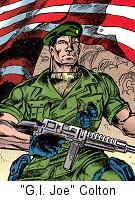|
 The
VigilanceVoice The
VigilanceVoice
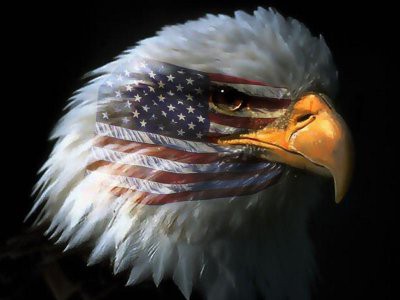
VigilanceVoice.com
Wednesday
-- June 19, 2002—Ground
Zero Plus 280
Martyr Medals:
Kids Honoring Suicide Bombers Create
Heroes Of Terror
by
Cliff McKenzie
Editor, New York City Combat Correspondent News
GROUND
ZERO, New York City, June 19--In the Balata Refugee Camp in the West
Bank, kids are giving up their soccer trading cards for "martyr medals"
honoring suicide bombers and others who have died fighting the Israelis.
At first glance, I was appalled.
Then, I forced myself to wear a child's glasses, and to see through the eyes
of a youth struggling to find some hero to aspire to.
As I looked through the lenses of a child
in the West Bank, I wondered what difference there was between a youth in
America posting signs and pictures of Adolph Hitler in his or her bedroom
and one in Balata Refugee Camp tossing away his Pokeman cards in favor of
“suicide bomber martyr medallions.” I realized how easy it is for
his or her “Heroes of
Liberation" to be considered our "Monsters of Terrorism.”
The more I wanted to throw stones at
the glass house of "martyr medals," the more I could see my own reflection
and the heavier the rocks became.
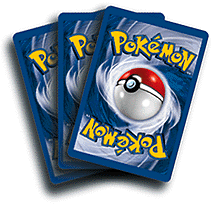
|
My first inclination was to indict a child who chooses to turn in a Pokemon
card for a medallion with the name of a young man or woman who walked into
a crowd of innocent civilians and blew up everything in sight. Such
an act at first glance seems a a violation of all "civilized nature."
A child who honored a horrible "hero"
such as a suicide bomber or one who died shooting at Israeli's seemed at
first blush a
deranged hoodlum, a recalcitrant, incorrigible youth whose actions were
indefeasible in any court of human compassion.
Then I stopped my indictments and thought of my own childhood.
As a reporter I am responsible for looking at both sides of any coin--no
matter how much I might detest what is on the side I prefer not to
examine. What I saw when I flipped the coin startled me. It
also changed my opinion of "total indictment" about the kids in the West
Bank wearing "martyr medals."
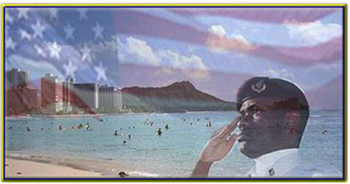 |
I spent my puberty in Hawaii. My father was stationed at Hickam Air Force Base,
situated next to Pearl Harbor on the island of Oahu. From my home at
1402 Porter Avenue, I could look through the fence at the site of the
Japanese attack on December 7, 1941. We arrived in Hawaii when I was nine
and left when I was twelve years old.
One of my most vivid memories was of our Boy Scout Camp trips. We
stayed in old barracks high in the Hawaiian hills, lush with jungle
growth. The camp was still laced with trenches and bunkers
where Americans trained to fight the Japanese.
On a hill behind us
stood a white cross, a monument to where the first Japanese planes were
spotted on their journey to bomb Pearl Harbor during the infamous sneak
attack of December 7, 1941.
Our Boy Scout Troop played, “kill the
Jap” in our spare time. We broke into teams, the “good guys” versus
the “bad guys.” The "good guys" hunted down the “dirty Japs,”
relishing in killing them with make believe bullets, bombs and grenades.
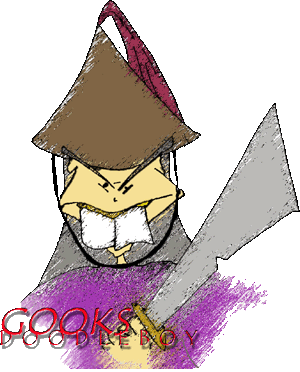 |
We used mangos for
grenades and sticks for rifles, but our intent was the same as had been
touted by our parents and the nation during the heat of the war—to rid the
plague upon this earth of all the “yellow devils.”
I remember propaganda posters dehumanizing
the Japanese, making it easy for one to view them not as human beings, but
as sources of "evil" bent on destroying all the children of America and
imposing their culture on ours. Anyone who defended the
Japanese was considered disloyal to America.
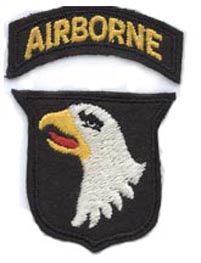 |
| The
favorite patch in my collection : The Screaming Eagles
|
World War II was less than a decade old when I fought these
make-believe battles. My heroes were the Marines who “blasted the
enemy,” destroying them mercilessly. The Japanese were the
"Evil Ones," as the Taliban is today in the aftermath of September 11,
2001.
Signs of the war were prevalent
throughout the island. Many buildings still wore the scars of the attack
where large chunks of concrete were blasted away by the Zero’s 20mm machine guns. Twisted metal
defenses still speared out of water around Ford Island where I often took
my dog for walks and pretended I was patrolling the beaches from enemy
assault.
The Korean War was winding down when
we arrived at Hickam.
Military forces swarmed the island. I was privy to many comments about
the "gooks" that had been killed in Korea. To earn
spending money, I had taken up shining shoes and went from barracks to barracks shining the GI's
shoes who were passing through. I heard many stories as I shined
their shoes, and collected a raft of shoulder patches for my collection
and kept them in a "box of heroes," symbols of the guys who were fighting
for my freedom
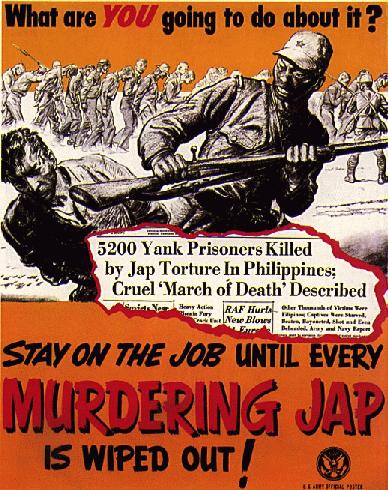 |
|
WWII
anti-Japanese Propaganda Poster |
When we tired of playing "kill the Japs," we took up the next
favorite game-- “kill the Nazis.” We conducted similar battles, breaking
into teams and hunting the Nazis to death. If I was on the “good side,”
I assumed the role of an American soldier fighting to cleanse the earth of
the SS troops. We made the enemy "ugly" by pretending they all
had Hitleresque moustaches and evil stares. (At the time I was into
making model planes from balsa wood kits and was fascinated with the
German Messerschmitt fighter plane. If I was picked to be
Nazi, I always pretended to be a Messerschmitt pilot. They
were the coolest.)
As my mind whirred back in time
to my own childhood, I realized I had indicted the "enemy" with a
viciousness not dissimilar to the children of the West Bank. I
saw my "Evil Ones" as "inhuman creatures" whose
extinction would guarantee my safety, and that of my sister and two
brothers. The more I reflected on my own childhood
experiences at lionizing our cause and trying to crush the "enemy's"
cause, the less I felt justified to indict those who wore "martyr medals."
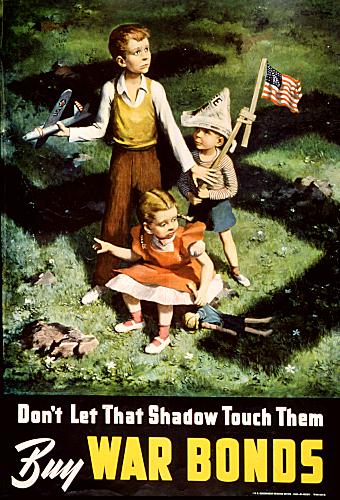 |
|
WWII anti-Nazi propaganda poster |
I’m sure there are many children in America playing “war” as I did. Instead of killing "Germans" or "Japs,"
they are “killing” Osama bin Laden and his “bad, evil people.” As I did,
they are justifying the “right to kill” by associating with heroes such as
those represented in the recent award winning film, Black Hawk Down.
The film depicts a fierce battle in Somalia where America’s crack troops
kidnapped a “bad guy” and got caught in a horrendous crossfire.
The film promoted the American martyrs, but offered no perspective to
those the Americans were fighting against, or presented the "enemy's" cause for
inspection. It was similar to a propaganda poster, totally
one-sided, providing a dehumanized sense of the "enemy" and honoring only
"our heroes" without an ounce of empathy for the "Evil Ones" or their
cause.
It is easy for me or
anyone for that matter, to be righteously indignant about children of
another land cheering over the death of the "innocent" or lionizing
their "freedom fighters." I wonder how many Americans jumped
with joy when the atomic bomb was dropped on Hiroshima and tens of
thousands of men, women and children were killed? Or, perhaps
we should forget the elation of the Dresden fire bombing in which almost
as many were killed?
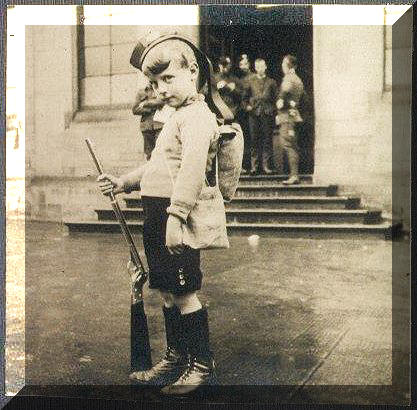
|
War demands one not to hesitate
in the muck of morality during the heat of battle. To do this it is
necessary to dehumanize the enemy and their families, their culture, their
history.. That way, it's easier to "kill them," so when their bodies
stack up one looks at the remains as "cords of wood" rather than "souls
lost." The warrior becomes the hunter, the dead, the hunted.
Bodies become trophies.
While I do not defend or
support indiscriminate violence, especially against unarmed civilians, it
would not be fair to dehumanize a child in the West Bank wearing the medal of a martyr
just as it would not be fair to dehumanize a child in America who plays
"kill the turban-heads" with his G.I. Joe toys. In America, "Sergeant Rock" is
our martyr-medal warrior.
Sgt. Rock is willing to die for his country but only after killing all the
"Evil Ones" in sight. He doesn't
ask his bullets or grenades to distinguish between killing the enemy or
the young boy bringing the enemy water. He is a "killing machine."
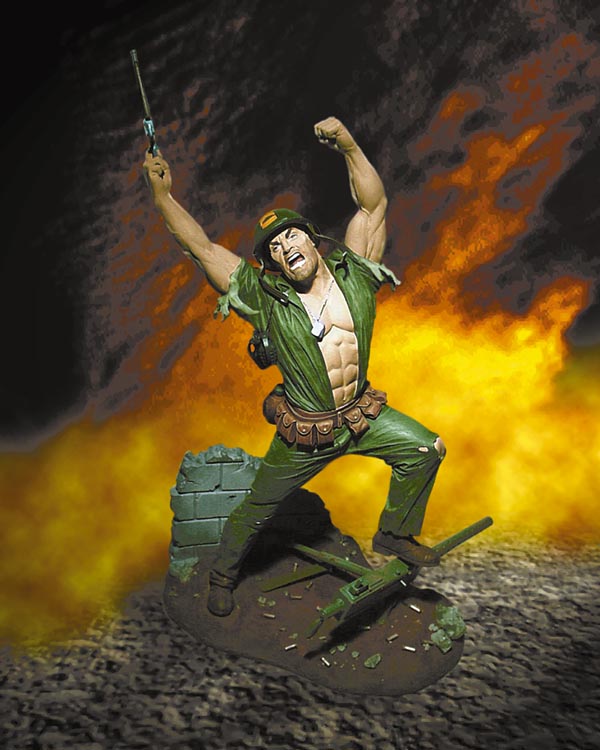
|
|
Matell's Sgt.
Rock |
In distant lands where cultures reach back thousands of years, and the
rights of ownership are blurred by history and politics, it becomes
difficult to say who has the "right to die" for the land in question.
Culturally, many in the Middle East believe the occupation of
“their land” is being done illegally. Many feel that every citizen of
the occupying state is an “enemy,” and that by bombing or attacking the
civilians, they are attacking the occupying force.
As I child, when playing my “war games,” I didn’t distinguish
between a uniform and civilian clothes. Any German or Japanese was the
“enemy.” If the "enemy" were in civilian clothes, they surely were a
spy. Under the Rules of War, a spy can be executed rather than taken
prisoner. Ergo, kill everyone. And, we continue to
promote that point-of-view in most of our modern media.
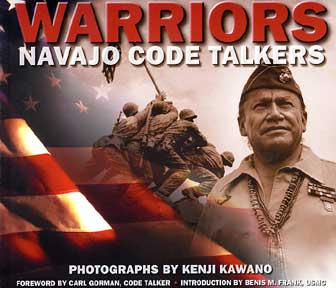 |
In the recent movie with Nicolas Cage,
The Windtalkers, Director John Woo allowed the Americans to kill
hundreds of Japanese with single clips of a machine gun. I thought
it incredulous that our American heroes survived an onslaught of “enemy
bullets" while countless Japanese lay dead from a single swipe of Cage's machine gun barrel. It was as though
our bullets were laced with “saintliness” and the Japanese's were
malformed so they never struck their targets with any accuracy.
(Incidentally, I walked out of the movie, sickened
by its exploitation of facts and it twisted manipulation of an otherwise
great story that could have honored rather than smirched the image of the
Marine Corps and Native Americans).
The movie presented the Japanese as a race of "yellow devils" and we,
as the "liberating" force of Justice. It created once
again "joyous justification" for deaths of many. And, it
taught any child watching the movie the "right to hate the enemy."
Children are trained by their culture to defend its
right to exist. As I
child, I grew up believing in my duty to defend my nation. In
Vietnam, I was more than willing to die for my country. I never gave a
second thought to whether our presence in Vietnam was right or wrong. I
fought for the flag. I fought for the Marine Corps. I fought for
the Principles of Freedom as I understood them.
All communists were our enemies in my mind set. Vietnam became a place
where the measure of the enemy was the shape of their eyes, the
color of their black pajamas, the unintelligible sing-song language they
spoke A 500-pound bomb did not question who it killed, or a 7.6mm steel
jacketed bullet did not stop and ask its
target on which side of the fence--friend
or foe--
it stood before slamming into it. And, I didn’t question
pulling the trigger. One can't pause to reflect the morality of war or one dies.
War erases morality. It suspends compassion. It makes
kids throw away Pokeman cards and don "martyr medals."
Today, I have
learned to pause before I pull the trigger. I pause and
think through my beliefs to insure that what comes out of my mouth is more
Vigilant than Complacent. I do not blindly accept things as I
once did, for I have a broader vision based on much experience, and many
scars from the errors in judgment I have made about others. I also
carry the shame and guilt of killing indiscriminately--something most
reporters can never fathom because the eyes of those they killed by
"accident" do not appear in their dreams to haunt them.
Today, I do my best to think through the eyes of the children in
lands far away as well as here at home. The children in the
Balata Refugee Camps may be no different than the children of the
Revolutionary War America fought over two-hundred years ago.
|
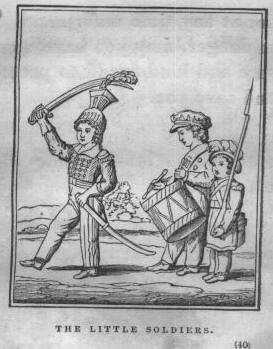 |
I wondered how the
children then reacted to the British
patrolling the streets of America?
Did they set booby traps?
Did they take sticks and pretend to kill the “Redcoats?”
Did they put a mark on a stick with the name of someone they knew
who died for the Revolution?
Did they make martyrs out of those who gave
their lives against the British Empire?
It seems likely children of any land would honor their “heroes" as
the makers of G.I. Joe have learned. The G.I. Joe toy found a big audience
when it first came out, and then during the Vietnam War it began to fall
out of favor. Now, it has been resurrected after September 11 and sales are soaring as
parents rush to get a set for their child.
Unfortunately, children don't delve into deep political or moral discussions over the “rights” of their enemy.
All they know is that this "force" is trying to kill them, their mothers,
fathers, their "family." Turf wars in American cities are
similar. The "Bloods" and "Crypts" are one example.
West
Side Story illustrated the battles of ethnic street wars. Gangs
in America will "kill" over any "turf invasion." Just ask anyone in
Los Angeles who has been a victim of a "drive-by-shooting."
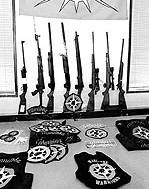
|
Rappers are
considered "urban Terrorists" by many. They advocate the killing of police,
and promote a hatred toward authorities who they claim brutalize their
culture and oppress their children.
Just up the block from where I live in the
East Village of New York City, an African American shot a white man in the stomach, dragged
a woman into an upscale wine bar, doused the patrons with kerosene and
threatened to ignite them all because they were "white." He
shot and wounded two people and was tackled by a couple of women, wrestled
to the ground and wounded by the police. He left a note for his son
telling him to "live a good life," and that he, the father, would be his
"guardian angel."
Will the boy's father become a martyr in his
son's eyes?
Was his father justified in his "revolt" against "white
oppression?"
Will the kids in the "hood" wear martyr medals in
his behalf?
One's heroes requires a thorough examination of
their culture prior to a blanket indictment. If a child is
brought up in a world of hate and anger against a certain race, or color
or creed then any an all who retaliate against the oppression--or
perceived oppression of that culture--may be subject for "heroism" in the eyes of
the children who comprise that culture.
In my own case, I aped the sentiments of my parents, grandparents, uncles and
aunts, teachers, newspapers and the culture I belonged to
against the Japanese and Germans.
.
My culture was also an oppressed culture. I came from the "other side of
the tracks." I grew up wearing the yoke of the divisions between "rich and
poor." I believed there was a line drawn in the sand I could not cross
because I was born on the "other side" --the poor side, the
underprivileged side. I felt
gypped, cheated.
The military--my childhood culture--is a caste system. Feudal
lines are drawn between the gentry and elite. You do not cross them.
Enlisted do not mix with officers by edict. Enlisted kids did not
date officer's kids.
I revolted against my culture.
I repudiated my background and went to college. I fought to distance
myself from my roots. I had no martyr to inspire me, but if I had, I
might have worn his or her medallion. I might have been driven by
his or her example and honored the image, not the act, of "freedom at any
expense."
That's why I have to pause before I
indict the children in the Batana Refugee Camp for elevating their martyrs
to hero status. To them, those who strap bombs around their
waists and wade into the middle of the “enemy” and die in the process, are
paving the way for their “freedom,” blasting their way toward an
“independence,” they feel is
rightfully theirs.
Does this make the children wrong for wearing a “martyr’s
medallion?”
To answer the question I put myself in that situation.
. What would I do were I a child in a war-torn
country, watching tanks and troops patrolling what I considered my
“land?”
Would I throw rocks at
them?
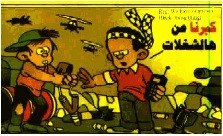 |
Would I consider becoming
a martyr and strapping on a bomb?
Would I learn how to use
a rifle and snipe at them?
Again, I am not justifying or condoning any actions by children
or adults that leads to the destruction or maiming of the innocent.
However, I am painting a gray picture, one that is blurred and
distorted; one that demands we think and reflect before we condemn and
execute a final opinion of righteousness against others.
The lesson at hand
demands we must first examine our own history, our own
prejudices, our own sense of nationalism in light of those we might want
to condemn.
“What would we do if the tables were
turned?”
We must ask this of the child in us, not the adult.
I illustrate this portrait of "shades of gray" because as adults,
Citizens of Vigilance, Parents of Vigilance, Grandparents of Vigilance,
Loved Ones of Vigilance, we must be cautious to not righteously condemn
others in the presence of our children, or grandchildren, our Loved Ones.
Ideally, we don't indict anyone even in the privacy of our thoughts
without first looking at both sides of the coin.
By intention or default, we can
form in our children's minds a blanket approval of violence against
others. We are, after all, our children's heroes. They
want to be like us. The old adage that says, "If you want to know
what a child will be like when he or she grows up, just follow him or her
home and watch his or her parents."
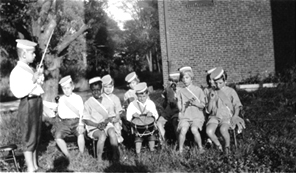 |
If we offhandedly issue our opinions from a narrow point of view, we can
create a wall of black and white where a child sees all "Germans" as
evil, all “Japs” as threats, all “Middle Easterners” as children of Osama
bin Laden, all "Whities" as oppressors, all "African Americans" as
revolutionaries. By letting our prejudices rule without
cautious examination of their intent or justification, we can
anesthetize our children from asking moral questions, and strip them of
the responsibility for fairness in their opinions. Herbert Spencer
said the worst ill of mankind is "contempt before investigation.".
America’s 72 million children, 18
years or younger, are sponges soaking up the the opinions of their
parents, relatives and loved ones. They assimilate viewpoints
expressed by their guardians, some of which are embraced, some of which
are rejected. My older daughter, for example, nearly broke my heart when
she registered as a Democrat. But after some thought, I was
proud she had learned to act on her own beliefs regardless of her parents
Conservative Republican attitudes.
Not all children in the Middle
East collect martyr medallions just as not all children in the U.S. play
with G.I. Joe.
Not all want to participate in the violence, or agree with it as a
solution. We hear only about those who “stand out of the
crowd.” We don’t hear about those who weep over the loss of
their friends, or recoil from the hate and anger.
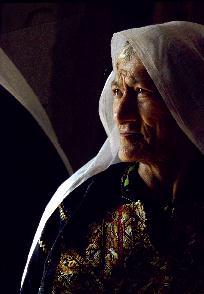 |
There always is another side to every coin. I saw on CNN news
yesterday a Palestinian woman chiding her neighbors for cheering the
recent bombing in Israel that killed a score of people. She
admonished her neighbors for being joyous about the destruction, and cried
on camera: “How could you honor such an act?” she demanded.
She was a Voice of Vigilance in
a world of torn Tyranny.
Her children, if she has any,
surely have a home front that dissuades them from not wearing martyr
medals.
But how many parents in America would tell their child someone wearing a
T-Shirt with the words blazed on it: “Osama bin Laden: Wanted,
Dead Not Alive!” is advocating violence when they should be promoting
appeasement?
Would we, as a collective
nation, cheer as we pinned a Congressional Medal of Honor on the neck
of he or she
who chopped off Osama’s head?
Would we offer lesser but
still glorious "hero tributes" for each of Osama's dead
lieutenants, sergeants, corporals, privates?
How about their wives and children who support
them, feed them, arm them? Would they be included in the widening circle of
“justified enemies?” Would they be considered "Evil Ones Once
Removed?"
How far would the circle of
"righteous indignation" span?
Who would be excluded? Why?
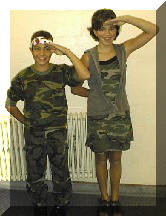 |
Children don’t think in such critical terms. Instead, they see
black and white—at least I did. A “Jap” was a “Jap.” A “Nazi”
was a
“Nazi” and all Germans were potential Nazis.
In Vietnam we had “free fire zones”—areas
where we were allowed to shoot anything that moved—men, women or children.
If 'it' wore black pajamas, if 'its' skin color was yellow and if 'it'
rustled a bush or ran, 'it' was a target of opportunity. Some
warriors like Senator Bob Kerry got heroes medals for killing the innocent
by "accident." .
Vigilance means we, as guardians of our children’s morality toward
others, must use our common sense when we express our opinions about
others—whether it be the ethnic group down the street, or the faceless
enemy of Terrorism far across the sea.
 |
We are the mirrors of either Terrorism or Vigilance for our
children.
If we carry
medallions around our neck demeaning certain groups or individuals
we have maimed or murdered with our prejudices, bigotry and
revulsion, we need to take them off and bury them before
we indict others who wear them in far-away lands.
If we truly are Citizens
of Vigilance and Parents of Vigilance, we must clean up our
own houses before we throw stones at others. Prejudice
and bigotry are horrible Terrors that deface one's view of others
and the world. When our children see we do not wear
martyr medallions, they may be less inclined to seek out their
own.
Instead of cheering
Terrorism, our children need to cheer Vigilance.
And, as with all battles against Terrorism, the roots of Vigilance
begin at home. One step in sinking them deep in
our children is to destroy our "martyr medals" of
prejudice and bigotry toward others.
We must never forget
that those who died in the World Trade Center--our Sentinels
of Vigilance--represented 80 different nations, and countless
hundreds of different cultural viewpoints.
The less we
righteously indict others, the louder the Sentinels of Vigilance
sing.
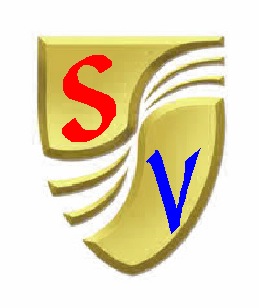
Go
To June 18--Awaiting The Child Of Vigilance
©2001
- 2004, VigilanceVoice.com, All rights reserved - a ((HYYPE))
design
|
|












.jpg)





